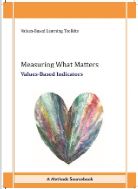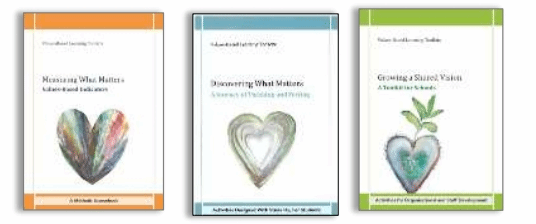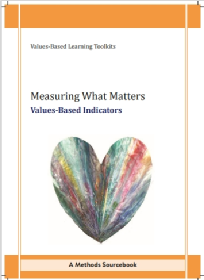Project short name:
PERL


Partnership for Education and Research about Responsible Living
Keywords: Schools // Indicators // ESD// PERL// values-action gap //
Funded by: The Erasmus Academic Network project of the European Lifelong Learning Programme 2012-2015
Key team members: GB; MKH; EH.
Key Contributions to WeValue Platform Knowledge:
This was an early project (2012) when much was still unknown. It explored:
a)the values-action gap in responsible living (12)
b)possibilities of using separate early WeValue concepts (such as values-based photo-communication and trigger lists, intersubjective discussions), for Education for Sustainable and Responsible Living, in secondary schools (6,7,8).
Relevant papers published: 6,7,8,12 in the Publications List
Official websites PERL2 (2012-2015) - University of Inland Norway
https://www.inn.no/english/ccl/research-and-development-projects/past-projects/2012-2015-%28perl2%29/index.html
https://www.brighton.ac.uk/research/groups/values-and-sustainability/perl.aspx
Official purpose:
·To prepare a toolkit for teachers explaining the use of particular elements of the ‘WeValue’ approach, (such as values-based photo-communication and intersubjective discussions), as developed during the ESDinds project
·To train teachers in the use of the toolkit
·To translate the toolkit into Spanish or Portuguese
·To test the toolkit in two schools in different EU countries
Project findings and impact
An early finding was that merely changing the wording of the ‘WeValue’ materials, initially created for civil society organisations, was not enough to make them relevant and useful for busy teachers. Rather, it was necessary to separate out three different applications of the ‘WeValue’ approach – teaching and learning, strategic planning, and evaluation – and develop each one as a separate toolkit.
New indicators and activities, tailored specifically for schools, were also found to be necessary. Through pilot tests in secondary schools in the UK and Finland, we were able to identify which activities worked well and which were less successful within different contexts, e.g. whole-class sessions versus Student Council meetings. Detailed findings are available in the toolkit testing report and further tests are ongoing at a school in the Netherlands.
The findings of the workgroup were presented at the PERL project conference held in March 2015 at UNESCO, Paris. The values-based indicators approach has attracted attention within the context of the Global Action Plan for Education for Sustainable Development and the 10-Year Framework of Programmes, and new large-scale funding bids are planned.
Findings from the project have already been cited in the International Environment Forum’s response to a consultation on the report Indicators and a Monitoring Framework for Sustainable Development Goals: Launching a data revolution for the SDGs, published by the Leadership Council of the Sustainable Development Solutions Network (SDSN) in January 2015. In this report, it was noted that our work provides a practical way of responding to ‘Complementary National Indicator 4.1 [Percentage of girls and boys who acquire skills and values needed for global citizenship and sustainable development by the end of lower secondary education]’, and may be useful for developing the national benchmarks called for by SDSN in relation to this indicator.

Formal documents and publications
The three draft toolkits are available for free download below:
An excellent context-setter of the fourth pillar of SD (concerning shared values/ethics/culture) and how it is now tangible and measurable.
Measuring What Matters - Values-Based Indicators (A methods sourcebook)
This is a Toolkit from part of an international project that (The Partnership for Education and Research about Responsible Living (PERL), funded by the EU) which describes methods for selecting values-based indicators for use in secondary schools and similar learning situations.
Growing a Shared Vision: A Toolkit for Schools: Activities for Organisational and Staff Development
A toolkit for use by teachers and school staff in creating a values-based learning environment in their school.
Journal article
Burford G, Hoover E, Dahl A, Harder MK. Making the invisible visible: designing values-based indicators and tools for identifying and closing 'value-action gaps'. In: Thoresen VW, Didham RJ, Klein J, Doyle D, editors. Responsible Living: concepts, education and future perspectives. Cham, Switzerland: Springer International; 2015. p. 113-34.
PERL: Further information
PERL is a partnership of educators, researchers and practitioners from more than 140 institutions in over 50 countries. It has existed since 2009 as an Erasmus Academic Network and is based on six previous years of the work by the Consumer Citizenship Network (CCN).
Disseminating knowledge about sustainability issues is rarely enough, in itself, to motivate long-term behaviour change. Focusing on global problems such as climate change, biodiversity loss and poverty often serves to increase people’s sense of despair and helplessness, and may result in apathy rather than positive action. An alternative approach, however, is to help people to reflect on what is important to them in life - their core values - and to envision the type of future that they want on the basis of those values. This approach has already been found useful for closing 'value-action gaps' in organisations promoting non-formal education for sustainability.
The PERL/PERL2 project was funded by the Erasmus Academic Network project of the European Lifelong Learning Programme, as a large multidisciplinary partnership of educators and researchers from over 140 institutions in more than 50 countries. It worked to advance sustainable and responsible living by focusing on consumer citizenship, education for sustainable consumption, social innovation and sustainable lifestyles, through a core of working groups supported by a consultants’ network.
Members of the Values and Sustainability Research Group, at the University of Brighton, participated in a PERL2 working group entitled: ‘Bridging the knowledge-action gap’, to design values-based approaches to Education for Sustainable and Responsible Living in secondary schools.
Wider Project aims
Building on the initial PERL project which ran from 2008-2011, the stated aims of the PERL2 project as a whole were to strengthen individual awareness of sustainable and responsible living, identify processes and new skills, share insights and cultivate partnerships.
Within this wider project, the first work package – Bridging the knowledge-action gap – was dedicated to values-based indicators, and designed to apply learning from the successful ESDinds project within the formal education sector. While traditional models of Education for Sustainability focus on the dire consequences of what has gone wrong, this work strand fostered a more positive and constructive approach, based on helping students to understand their values and create visions of the future that they want. There were four key objectives, given above.
Project impact
The findings of the workgroup were presented at the PERL project conference held in March 2015 at UNESCO, Paris.The values-based indicators approach has attracted attention within the context of the Global Action Plan for Education for Sustainable Development and the 10-Year Framework of Programmes, and new large-scale funding bids are planned.
Findings from the project have already been cited in the International Environment Forum’s response to a consultation on the report Indicators and a Monitoring Framework for Sustainable Development Goals: Launching a data revolution for the SDGs, published by the Leadership Council of the Sustainable Development Solutions Network (SDSN) in January 2015. In this report, it was noted that our work provides a practical way of responding to ‘Complementary National Indicator 4.1 [Percentage of girls and boys who acquire skills and values needed for global citizenship and sustainable development by the end of lower secondary education]’, and may be useful for developing the national benchmarks called for by SDSN in relation to this indicator.
Partners
The workgroup on ‘Bridging the Knowledge-Action Gap’ was chaired by
Professor Arthur Dahl (President of the International Environment Forum, former Deputy
Director of a United Nations Environment Programme, and Visiting Professor
at the University of Brighton).
Other workgroup members were:
Dr Sylvia Karlsson-Vinkhuyzen
Marilyn Mehlmann
Dr Kirsi Niimaki
Ismael Velasco, CEO, Adora Foundation
Dr Onno Vinkhuyzen
Dr Dana Vokounova
Alternative pictures:





yyyyyyyyyyyyyyyyyyyyyyyyyyyyy


